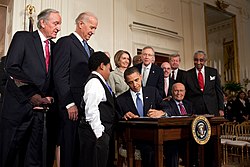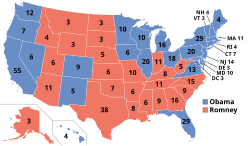US History/Obama

President Barack Obama
[edit | edit source]Barack Hussein Obama II (b.August 4, 1961) was the President of the United States from 2009 to 2017. He is the first African-American to serve as president.[1] He was the junior senator of Illinois in 2005. He was elected after serving part of his first term as a United States Senator, resigning from his senator position on November 16, 2008, following his election to the presidency.
Early career
[edit | edit source]Obama was a graduate of the University of Columbia and Harvard, where he was president of the Harvard Law Review.[2][3] Obama taught constitutional law at the University of Chicago from 1992 to 2004.[4]
He announced his candidacy for the senate of the United States in January 2003, gained a primary victory in March 2004, and was elected in November 2004. Obama provided orientation with national convention Democratic in July 2004. As a member of the Democratic minority in the 109th congress, he helped to create the legislation to order the conventional armaments and to support a greater public responsibility in use of the Funds Federal. He also made official trips in Europe, the Middle East, and in Africa. During the 110th congress, he helped to create the legislation relating to incentive and electoral fraud, climate change, nuclear terrorism, and the care for turned over military service members of the United States.
Hobbies
[edit | edit source]
Barack Obama is a very passionate sports fan and roots for the Chicago Bears, Bulls, Blackhawks, and White Sox. Obama is also a very avid basketball player and frequently plays competitive pickup games with his closest friends and advisors. Obama has a tradition on election day that he plays pickup games in whatever city he happens to be in.
First 100 Days
[edit | edit source]Seeking to replicate the first 100 days of FDR in office during the depression, Obama set out to spend his first 100 days addressing the recession. His principal policy for this was the American Recovery and Reinvestment Act of 2009, commonly referred to as the "stimulus package". The act funded infrastructure improvements, cut some taxes, gave money to struggling schools, and expanded Medicaid. By mid-2009, the private sector started to experience job gains rather than losses, and the stock market began to surge. However, some sectors experienced little to no growth.
Another key action of Obama's first 100 days was ceasing the use of torture.[5]
Domestic Policies
[edit | edit source]In 2014 The Obama Administration oversaw the creation of the United States Digital Service and 18F agencies to help assist the American government with digital initiatives.[6]
Obamacare
[edit | edit source]
Background
[edit | edit source]Obama and the Democratic majority in Congress spent much of 2009 debating a number of plans that would grant health insurance to all Americans while attempting to halt the steep rise in healthcare costs. The result was Obamacare, signed into law in early 2010 and rolled out in stages during the Obama administration.
Individual Mandate
[edit | edit source]The linchpin of Obamacare was the individual mandate, requiring nearly all American citizens to buy health insurance if they did not receive it from their employer or qualified for Medicaid. It limited the ways insurers could deny coverage, in particular requiring that coverage not be discriminated due to patients having pre-existing conditions. It also enacted mechanisms to subsidize health care and established a network of exchanges to buy health insurance on.
Facing Crisis
[edit | edit source]Environmental Disasters
[edit | edit source]On April 20th, 2010 the Deepwater Horizon drilling rig exploded, spilling 4 million barrels of oil into the Golf of Mexico, resulting in the largest marine oil spill in US history.[7][8]
Hurricane Sandy made landfall on the east coast in 2012, causing massive damage to urban areas.[9]
Many Americans during this time were affected by issues relating to water availability or quality. From 2012 to 2016 California experienced a continual drought.[10] In 2014 Lake Erie experienced a tremendous Algae Bloom, rendering drinking water undrinkable for 400,000 Americans near Toledo, Ohio.[11][12] In early 2016, it became clear that much of the water of Flint, Michigan was tainted with lead, attracting nationwide attention.[13] The lack of clean drinking water for Flint became a symbol of Environmental Injustice.[14]
-
Deepwater Horizon in Flames, 2010
-
Deepwater Horizon Oil Spill from Space - May 24, 2010
-
Power outage in Manhattan as Hurricane Sandy makes landfall.
-
A 2011 Algae Bloom in Lake Erie, similar to the 2014 Bloom.
-
National Guardsmen deliver water to Toledo Residents.
-
Obama speaks with California Farmers about the Drought, 2014.
-
A wildfire rages in California, 2014
-
Obama drinking filtered water from Flint, Michigan, 2016.
-
A Flint protestor in 2019. Issues with the Flint water supply persist.
Diseases & Drugs
[edit | edit source]The 2009 swine flu pandemic killed about 203,000 people worldwide,[15] 12,469 of whom were in America.[16] This was the disease that had the largest impact on the United States during the Obama Administration, though several diseases would threaten America and would be contained following this. The Western African Ebola virus epidemic nearly spread to the United States in 2014, though it was contained. Later on, the 2015–2016 Zika virus epidemic hit some areas of the southern US and Puerto Rico, though it was under control by early 2017.
Other medical issues continued to worsen in America. The Opioid epidemic continued to grow in severity during the Obama administration. A continuing Anti-Vaccine movement lead to the reintroduction of diseases previously eliminated from the United States.
Notable Domestic Incidents
[edit | edit source]Notable shootings and domestic incidents during this time include the 2009 Fort Hood shooting, the 2012 Aurora, Colorado shooting, the 2012 Sandy Hook Elementary School shooting, the 2013 Boston Marathon bombing, the 2014 Fort Hood shooting, the 2014 Bundy standoff,the 2015 San Bernardino attack, and the 2016 Orlando Night Club Shooting.
Other controversial incidents to occur during this time include the 2011 Zanesville, Ohio animal escape, the 2011 end times prediction, the 2011 Federal government credit-rating downgrades, and the 2012 Petraeus scandal
Tea Party movement
[edit | edit source]
The Tea Party movement generally wanted smaller government, lower taxes, and less government controls, particularly on firearms and healthcare. It received funding from conservative businesspeople, particularly the Koch Brothers. The Tea Party movement believed many conventional Republicans were not conservative enough, and took down a number of Republican leaders in primary elections. The enthusiasm of the Tea Party, coupled with malaise toward Obamacare, led to Republicans recapturing the House of Representatives in 2010.
Birtherism
[edit | edit source]During Obama's campaign and administration, there were unsubstantiated allegations that Barack Obama was not born in the United States. His certificate of live birth lists his birthplace as Hawaii[17], but a large cadre of Americans, including his successor Donald Trump, did not believe this. Other Americans believed an unsubstantiated claim that Obama was a Muslim. These "birthers" and "truthers" were often part of the Tea Party movement.
Obama Military Policy
[edit | edit source]Wars in Iraq and Afghanistan
[edit | edit source]Obama took office with the wars in Iraq and Afghanistan still raging. Though he significantly reduced troop levels, he did not completely withdraw from either country due to instability in those countries. Under Obama, the United States continued drone strikes in the Middle East.
Ten years after the terrorist attack that took place on September 11th, Pakistan officials gave President Obama a lead that Osama Bin Laden was hiding in a densely populated city in their country. On May 1st President Obama authorized a covert operation to terminate Osama Bin Laden and was successful.
US Cyber Command
[edit | edit source]In mid-2009 United States Cyber Command was established to unify cyber defense efforts.[18]
LGBT rights
[edit | edit source]During the Obama Administration, several states legalized gay marriage at the state level, either at the ballot box on in the state government. [19] Notably just prior to the Obama Administration, the California Supreme Court overturned the state's ban on Gay Marriage in 2008[20], before it was again banned by Proposition 8 during their fall election that same year.[21] In 2009 Congress passed the Matthew Shepard and James Byrd Jr. Hate Crimes Prevention Act which expanded the definition of hate crimes to include protection for sexual orientation, as well as gender identity.[22][23] Obama repealed the Don't Ask, Don't Tell rule in the military in 2011.[24] Prior to the 2012 election, Obama became the first president to come out in favor of nationwide gay marriage.[25][26]
During this time the general public slowly grew to accept LGBT rights, with polling showing approval for gay marriage surpassing disapproval of gay marriage after 2012.[27] Several religious organizations began allowing the ordinations of gay ministers, such as the Evangelical Lutheran Church in 2009[28] and the Presbyterian Church in 2011.[29]
In 2015, the Supreme Court legalized gay marriage nationwide.[30]
-
A protest in favor of equality in 2011.
-
A crowd gathers in the Minnesota capitol during the same sex marriage vote in 2013.
-
A crowd outside the Supreme Court on 26 June 2015 celebrates the Obergefell v. Hodges decision.
-
The White House was lit in rainbow colors on 26 June 2015 following the nationwide legalization of gay marriage
Education
[edit | edit source]Under the Obama Administration Charter School attendance grew, and attempted to make test results comparable across states with the introduction of Common Core standards, though neither were without controversy.[31]
Economic Reform
[edit | edit source]The Dodd–Frank Wall Street Reform and Consumer Protection Act in 2010 overhauled financial regulations following the Great Recession.[32] The Administration also oversaw the establishment of the Consumer Financial Protection Bureau.[33]
2012 election
[edit | edit source]
Primaries
[edit | edit source]Barack Obama was renominated by the Democrats.[34] Seven people ran in the Republican primaries: Michele Bachmann, Newt Gingrich, Jon Huntsman, Ron Paul, Rick Perry, Mitt Romney and Rick Santorum. Other prominent Republicans, such as Sarah Palin and Chris Christie, did not run, while Herman Cain and Gary Johnson aborted their campaigns prior to the first primary votes.
Mitt Romney
[edit | edit source]Romney was the frontrunner through most of the primary cycle, though he split the first three states with Santorum and Gingrich. Bachmann, Huntsman and Perry dropped out of the race following poor showings in the early primaries. Romney had broad support from most of the Republican establishment, while Santorum started by running an Iowa-only campaign, later branching out to Christian conservatives in all states. Paul's support was primarily among libertarian and young Republicans, while Gingrich's support was concentrated in the Deep South. By the end of March, Romney had a large lead in delegates, with Santorum winning several states before dropping out. Gingrich did not actively campaign anywhere but Delaware after March, and dropped out after losing to Romney in Delaware. By late April, Romney had clinched the nomination.
Results
[edit | edit source]The general election between Obama and Romney was expected to be very close.[35] Ultimately, Obama won every state he won in 2008 except North Carolina and Indiana, and defeated Romney.
Debt ceiling debates and government shutdown
[edit | edit source]The influence of the Tea Party and the debt ceiling crisis ultimately brought down the Speakership of John Boehner, and he was replaced by Paul Ryan, another Republican.
A Changing Country
[edit | edit source]The War on Drugs changes
[edit | edit source]The Justice Department during the Obama Administration had a relatively relaxed posture on marijuana, allowing states to determine their policy on it's local legalization, while keeping it illegal at a federal level.[36] Colorado became the first state to legalize marijuana for recreational use in 2014.[37]
Demographics
[edit | edit source]As the United States entered the 21st century, it continued to experience demographic and economic changes. Two of these were the "browning" and "graying" of America: the average age of Americans continued to rise as the "Baby Boom" generation aged, while half of people born in the 1980s or later were non-white, many the children of immigrants from Mexico and other Latin American countries. The aging of the American populace is one major contributing factor to the rise of the healthcare sector as a portion of the American economy. Fewer people were working in the manufacturing and mining sectors, with more working in the service sector or the temporary "gig economy".
Technology
[edit | edit source]Technology continued its advances during this time. Smartphones and tablet computers became widespread by the mid-2010s, as did membership on social networks, and consumption of media on the Internet.[38] Sleek new takes on Smart Glasses like Google Glass or Microsoft HoloLens did not perform well commercially, but captured the imagination of the public.
Space exploration shifted in this era towards more robotic exploration, with the retirement of the space shuttle program in 2011. NASA's Mars reconnaissance orbiter found evidence of water on Mars in 2011, with the Curiosity rover confirming it in 2015. The New Horizons probe, launched during the Bush administration in 2006, did a flyby of Pluto in 2015 gaining mankind their first high quality photos of Pluto.
-
Steve Jobs introducing the iPad in 2010, one of the first popular tablet computers.
-
Facebook joins the NASDAQ in 2012. Social media gained widespread popularity during this time.
-
Consumer Augmented Reality platforms, such as this headset, began to become available during the Obama administration, but did not achieve popularity.
-
New Horizons captured a high detail photo of Pluto for the first time in 2015.
Post-racial society...or not?
[edit | edit source]Many had hoped that the election of Obama would contribute to a society devoid of the racism that had always been part of the country's history.[39] However, racial tensions between Americans continued during the Obama administration.[39]
References
[edit | edit source]- ↑ Capatosto, Victoria. "A Brief History of Civil Rights in the United States". library.law.howard.edu. Retrieved 20 September 2020.
- ↑ "Barack Obama: Life Before the Presidency Miller Center". millercenter.org. 4 October 2016. Retrieved 21 September 2020.
- ↑ Butterfield, Fox (6 February 1990). "First Black Elected to Head Harvard's Law Review". The New York Times. https://www.nytimes.com/1990/02/06/us/first-black-elected-to-head-harvard-s-law-review.html. Retrieved 21 September 2020.
- ↑ "Obama Returns to the Law School University of Chicago Law School". www.law.uchicago.edu. Retrieved 21 September 2020.
- ↑ Shane, Scott; Mazzetti, Mark; Cooper, Helene (22 January 2009). "Obama Reverses Key Bush Security Policies". The New York Times. https://www.nytimes.com/2009/01/23/us/politics/23obama.html. Retrieved 21 September 2020.
- ↑ Scola, Nancy. "White House launches ‘U.S. Digital Service,’ with HealthCare.gov fixer at the helm". Washington Post. https://www.washingtonpost.com/news/the-switch/wp/2014/08/11/white-house-launches-u-s-digital-service-with-healthcare-gov-fixer-at-the-helm/. Retrieved 25 September 2020.
- ↑ https://www.epa.gov/enforcement/deepwater-horizon-bp-gulf-mexico-oil-spill
- ↑ https://www.noaa.gov/education/resource-collections/ocean-coasts/oil-spills
- ↑ https://www.nasa.gov/mission_pages/hurricanes/archives/2012/h2012_Sandy.html
- ↑ "California Droughts Compared USGS California Water Science Center". ca.water.usgs.gov. Retrieved 18 September 2020.
- ↑ Capelouto, Susanna; Morgenstein, Mark. "Water scare affects 400,000-plus in Toledo, Ohio". CNN. https://www.cnn.com/2014/08/02/us/toledo-water-warning/index.html. Retrieved 18 September 2020.
- ↑ Wines, Michael (4 August 2014). "Behind Toledo’s Water Crisis, a Long-Troubled Lake Erie". The New York Times. https://www.nytimes.com/2014/08/05/us/lifting-ban-toledo-says-its-water-is-safe-to-drink-again.html. Retrieved 18 September 2020.
- ↑ "Lead-Laced Water In Flint: A Step-By-Step Look At The Makings Of A Crisis" (in en). NPR.org. https://www.npr.org/sections/thetwo-way/2016/04/20/465545378/lead-laced-water-in-flint-a-step-by-step-look-at-the-makings-of-a-crisis. Retrieved 18 September 2020.
- ↑ "Five years later: Flint water crisis most egregious example of environmental injustice, U-M researcher says". University of Michigan News. 23 April 2019. https://news.umich.edu/five-years-later-flint-water-crisis-most-egregious-example-of-environmental-injustice-u-m-researcher-says/. Retrieved 20 September 2020.
- ↑ https://www.npr.org/sections/health-shots/2013/11/26/247379604/2009-flu-pandemic-was-10-times-more-deadly-than-previously-thought
- ↑ https://web.archive.org/web/20200318191813/https://www.cdc.gov/flu/pandemic-resources/2009-h1n1-pandemic.html
- ↑ Hawaii Certificate of Live Birth, Barack Obama
- ↑ https://www.npr.org/templates/story/story.php?storyId=105962021
- ↑ https://guides.ll.georgetown.edu/c.php?g=592919&p=4182201
- ↑ https://www.nytimes.com/2008/05/16/us/16marriage.html
- ↑ https://www.washingtonpost.com/news/the-fix/wp/2013/03/26/how-proposition-8-passed-in-california-and-why-it-wouldnt-today/
- ↑ https://www.apa.org/news/press/releases/2009/10/hate-crimes
- ↑ https://www.mtsu.edu/first-amendment/article/1517/matthew-shepard-and-james-byrd-jr-hate-crimes-prevention-act
- ↑ https://www.nytimes.com/2011/07/23/us/23military.html
- ↑ https://time.com/3816952/obama-gay-lesbian-transgender-lgbt-rights/
- ↑ https://abcnews.go.com/Politics/transcript-robin-roberts-abc-news-interview-president-obama/story?id=16316043
- ↑ https://news.gallup.com/poll/1651/gay-lesbian-rights.aspx
- ↑ https://www.nytimes.com/2010/07/26/us/26lutheran.html
- ↑ https://www.nytimes.com/2011/05/11/us/11presbyterian.html
- ↑ https://www.npr.org/sections/thetwo-way/2015/06/26/417731614/obama-supreme-court-ruling-on-gay-marriage-a-victory-for-america
- ↑ https://www.washingtonpost.com/news/answer-sheet/wp/2016/10/21/obamas-real-education-legacy-common-core-testing-charter-schools/
- ↑ https://www.npr.org/2013/05/08/181999098/nearly-three-years-after-dodd-frank-reforms-happen-slowly
- ↑ https://www.pbs.org/newshour/economy/making-sense/what-is-the-consumer-financial-protection-bureau-anyway
- ↑ https://www.nytimes.com/2012/09/07/us/politics/obama-in-democratic-convention-speech-asks-for-more-time.html
- ↑ https://election.princeton.edu/2012/11/06/presidential-prediction-2012-final/
- ↑ https://www.washingtonpost.com/news/wonk/wp/2016/11/30/obama-says-marijuana-should-be-treated-like-cigarettes-or-alcohol/
- ↑ https://www.npr.org/2014/01/01/258889992/starting-today-you-can-legally-sell-marijuana-in-colorado
- ↑ https://www.statista.com/statistics/201183/forecast-of-smartphone-penetration-in-the-us/
- ↑ a b https://www.washingtonpost.com/graphics/national/obama-legacy/racism-during-presidency.html

















